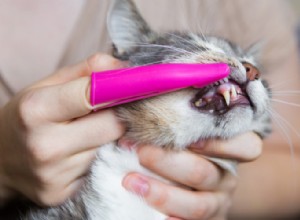
 10 trendů pro kočky v chovatelském průmyslu, které je třeba sledovat v roce 2022
10 trendů pro kočky v chovatelském průmyslu, které je třeba sledovat v roce 2022
 8 nejlepších klecí pro krysy
8 nejlepších klecí pro krysy
 Tipy pro bezpečnost ve vodě pro majitele domácích mazlíčků
Tipy pro bezpečnost ve vodě pro majitele domácích mazlíčků
 Dovolenkové tipy a návrhy pro majitele domácích mazlíčků
Dovolenkové tipy a návrhy pro majitele domácích mazlíčků
 Zvířata:Trendy zdravé výživy pro rok 2022
Zvířata:Trendy zdravé výživy pro rok 2022
 14 aplikací pro zdraví a pohodu psů pro majitele domácích mazlíčků
14 aplikací pro zdraví a pohodu psů pro majitele domácích mazlíčků
 5 nejlepších gadgetů pro majitele psů
5 nejlepších gadgetů pro majitele psů
 Kompostování pro majitele domácích mazlíčků
Kompostování pro majitele domácích mazlíčků
Po ekonomickém dopadu pandemie COVID-19 mohl každý využít pauzu na daních. I když se chov domácích mazlíčků může zdát jako práce na plný úvazek, nemůžete si nárokovat domácí mazlíčky jako osoby závislé na daních – ale můžete umět odepsat výdaje na domácí mazlí pokud splňujete určitá kritéria, pomůže vám to udržet více vašich těžce vydělaných peněz v kapse.
Zde je vše, co potřebujete vědět o uplatnění odpočtu daně pro domácí zvířata v roce 2022 :
Svého mazlíčka můžete uplatnit na daních, ale pouze ve specifických situacích které se obecně vztahují na služební zvířata a příjmy z podnikání. Existují různé daňové odpočty pro domácí mazlíčky, na které můžete mít nárok, což vám umožní odepsat výdaje na domácí mazlíčky, jako jsou:
Níže je pět nejčastějších daňových odpočtů pro domácí zvířata, na které můžete mít v roce 2022 nárok . Promluvte si se svým účetním a požádejte o nejlepší radu, jak uplatnit své zvíře pro daňové účely.
Většina lidí si nemůže v daňovém přiznání odečíst léčebné výlohy pro domácí mazlíčky, ale kdokoli si může odečíst léčebné výlohy zaplacené během daňového roku, které přesahují 7,5 % jejich upraveného hrubého příjmu pomocí Plánu A (formulář 1040). Proto si možná budete moci na své daně nárokovat domácí mazlíčky, pokud vám pomáhají ve zdravotním stavu nebo provádějí určité služby.
Například osoby, které jsou zdravotně postižené a spoléhají na pomoc služebního zvířete, mohou mít možnost nárokovat psa jako kvalifikovaný léčebný výdaj . Výdaje na domácí mazlíčky můžete odepsat pouze u psů, kteří provádějí specifické služby, jako jsou tyto:

V některých případech můžete svého psa zaúčtovat na daních tím, že požádáte o odpočet daně na zvířata za citovou podporu . Mějte však na paměti, že ačkoli každý mazlíček může poskytovat emocionální podporu, ne všechna zvířata se kvalifikují jako zvíře emocionální podpory (ESA) , jinak známý jako terapeutický pes.
Abyste mohli uplatnit svého služebního psa v daňovém přiznání, musíte být schopni prokázat, že vaše zvíře pomáhá léčit diagnostikovanou duševní nebo fyzickou potřebu . Buďte připraveni poskytnout potvrzení od svého lékaře jako důkaz, že potřebujete servisní nebo podpůrné zvíře.
If you’re a business owner, you may be able to get a tax deduction for pets that provide a service for your business. In this case, you’d be claiming a business expense deduction , so you’d have to be able to prove that the cost of keeping your pet is a necessary part of operations .
For example, you might be able to claim a deduction if you rely on a cat to protect your business from pests, or take a deduction for dogs working on your farm to protect livestock from prey.
If you want to claim pets as a business expense , hold on to all your receipts related to their caretaking. Examples of expenses you can write off include food and veterinarian costs. You should also keep a record of how much time the animal spends at your business.
If your pets perform in some way that earns you income, you may be able to claim them (and their related costs) as a business expense . For example, some people ride horses as a hobby, but if you perform by riding a horse and make an income from it, the IRS might consider the cost of caring for that horse as a qualified business expense .
If your dog appears in commercials, television shows, movies, or print advertisements, they could also be considered part of a business venture . The same could be true if your cat is the star of your monetized YouTube channel, in which case they may qualify for influencer tax write-offs .
Just be sure to keep accurate records of every expense related to your pet and the activity that earns income . This might include the money you spend on monthly pet insurance premiums as a means to protect your business investment.
If you foster animals, you might be able to get a tax break on your income return. Every expense made on caring for foster animals could be deducted as charitable donations, so long as the animals are from a qualified nonprofit organization.
Most nonprofits will pay for the cost of food and veterinary care for the animals you foster, but any necessity you pay for out-of-pocket is a tax-deductbile pet expense.
If you volunteer at animal shelters or rescue organizations, you may be able to deduct fuel costs , so keep track of your mileage. Note that this pet tax deduction only applies to driving done in service to the organization’s mission, not to your commute.
Finally, you may be able to claim pet expenses on taxes if you spent money transferring them to a new home in 2021. However, you can only write off pet expenses related to moves that meet certain conditions established by the IRS:
In order to claim your dog or cat on a tax return, rather than taking a standard deduction, you’ll need to write off pet expenses as itemized deductions .
When most people file their taxes, they take the standard deduction , a pre-set number (updated annually) that the IRS allows you to deduct from your taxable income without any questions asked. When filing in 2022 for the 2021 tax year , the standard tax deduction that you can claim based on your filing status is:
Alternatively, you can also itemize deductions by adding up the dollar amount of each qualified expense in 2021. That’s how you can claim pets on taxes, including their vet bills, pet insurance, food supplies, and more. Just remember to keep receipts on record to support every pet expense you claim, as well as proof that your pet is tax deductible , to safeguard against an IRS audit.
However, if all of your itemized deductions from the 2021 tax year don’t amount to much, you’re probably better off taking the standard deduction versus claiming your pet on a return .
If you think the amount that you can write off in pet expenses (in addition to all other tax deductions you may qualify for) is greater than the standard deduction, then it’s worth calculating the total amount, so you can get the biggest tax break possible. We recommend talking to a professional for help.
No, pets are not considered dependents for tax purposes.
Veterinary bills, pet insurance, food, supplies, training, grooming, boarding, and transportation costs are all examples of pet expenses you can write off on taxes. However, you can only claim pets on taxes if they meet certain criteria, such as contributing to income or serving a medical need. Talk to a professional to see if you can file your dog or cat on your taxes.
Yes, pet medical expenses are tax-deductible for pets that are classified as service animals or working animals. You might also be able to claim vet bills on taxes for pets you foster, provided that the nonprofit organization you work for is registered with the IRS and has not reimbursed you for the service.
If you’re looking for a way to get reimbursed for your family pet’s medical expenses, pet insurance is a great tool that can help reduce veterinary expenses in the future.
Most of the pet deductions people typically think of — such as claiming vet bills on taxes or writing off pet insurance — are actually eligible write-offs for those that qualify. However, many taxpayers are surprised to find they can’t claim a pet on a tax return due to the classification of the animal, or lack of sufficient proof required to support the pet deduction. Others are surprised to learn that you can’t claim pets as dependents on taxes.
For services animals, the The IRS explains that the animal will likely have to be trained and/or certified to help treat a diagnosed illness or condition — and you may need a doctor's note describing the medical necessity. For a working animal, you'll likely have to prove that the animal is "ordinary and necessary" in your line of business.
Always check with a tax professional, but it looks like if your dog or cat is the star of a monetized YouTube channel, for example, they might be classified as a performance animal. In which case expenses related to your pet and the activity that earns income could be eligible for influencer tax write-offs.
Always consult a tax professional, but generally, people determine if their itemized deductions exceed the standard deduction amount before deciding to itemize.
If you had to move for work, those moving expenses (including any involved in transporting your pet) could be eligible for a deduction, such as professional carrier services, transportable crates, lodging fees, etc.
Two big ones. (1) Preventive/routine care appointments play a major role in helping health issues before they get too expensive, so please schedule regular vet appointments. (2) Pet insurance is a great way to hedge the financial risk of unexpected accidents, illnesses, and emergencies — and there are no health networks to worry about. Pet insurance can reimburse you for up to 100% or more of the vet bill after your annual deductible is met, which can be a literal life (and wallet) saver, as serious health issues can easily cost thousands to treat.

Zubní onemocnění je pro většinu kočkovitých šelem realitou. Podle odborníků jen asi 10 % koček prožije život, aniž by zažily nějaký druh zubního problému . Protože však kočky skvěle maskují příznaky, může být pro majitele náročné odhalit i ty nejmenší příznaky nepohodlí nebo bolesti u svých mazlíčků

Rok 2022 je oficiálně za námi a jak lépe přivítat Nový rok než s naší nejlepší kožíškem - kamarádi? Ať už chcete shodit pár kilo nebo si najít nový koníček, domácí mazlíčci mohou být skvělými motivátory. Takže stanovení cíle, kterého můžete vy a váš pes společně dosáhnout, vám může pomoci dodržet ta